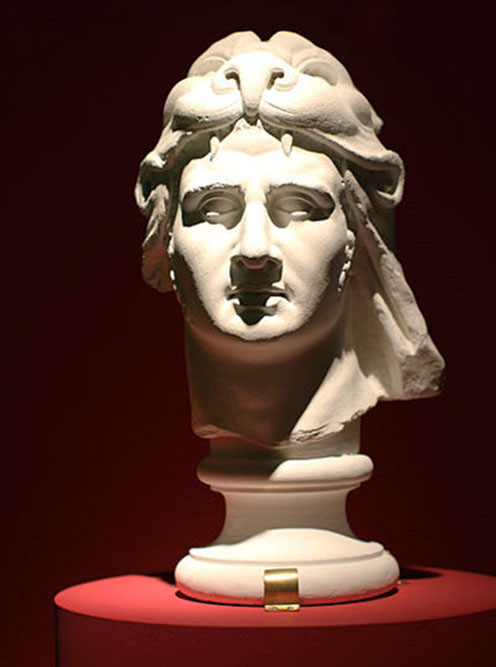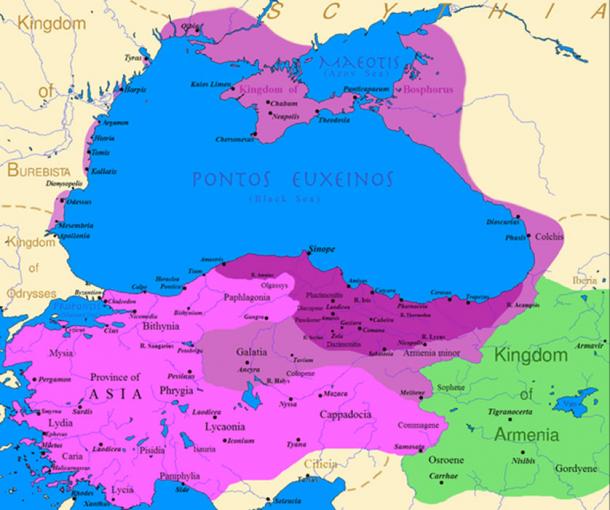The Poison King of Pontus
Mithridates (spelled also as Mithradates) VI, whose full name is Mithridates VI Eupator Dionysius, was a famous king of Pontus, a Hellenistic kingdom in Asia Minor of Persian origin. Mithridates lived between the 2nd and 1st centuries BC. He is best known for his conflict with the Roman Republic in the three Mithridatic Wars, in which the Pontic king fought against three prominent Roman generals – Lucius Cornelius Sulla, Lucius Licinius Lucullus, and Gnaeus Pompey Magnus.
Early Life
Mithridates is believed to have been born sometime around 130 BC and was about 13 years old when his father, Mithridates V Euergetes was assassinated. Although Mithridates inherited his father’s throne, he was still a minor at the time, and the kingdom was ruled by a regent, Laodice VI, a Seleucid princess who was the mother of the boy king. Laodicea is said to have been a suspect in her husband’s murder, and, fearing for his own life, her son went into hiding himself.
During this time, Mithridates apparently consumed various types of poison in small doses in order to develop immunity against them, should an assassin attempt to kill him by this means. In addition, the Pontic king is reputed to have experimented on and concocted one of the best-known antidotes in antiquity. This antidote, known in English as Mithridates, is believed to have been a ‘universal antidote’ that could counter any type of poison.
Taking Over the Kingdom
Around 116 BC, Mithridates came out of hiding and confronted his mother. The young king successfully removed his mother from her throne and had her thrown into prison, where she eventually died. During her regency, Laodicea had favored Mithridates’ younger brother, Mithridates Chrestus, perhaps as he was more malleable to her will than his older brother. He too disappeared from the scene, possibly shortly after his mother’s imprisonment. One suggestion is that Mithridates had both his mother and brother murdered.
With these rivals out of the way, Mithridates became the sole ruler of the Pontic Kingdom.
Mithridates then began to enlarge his kingdom, as a continuation of his late father’s expansionist policy. In 115 / 114 BC, the young king crossed the Black Sea so as to intervene in a conflict that was going on between the Hellenistic settlements on the Crimea and their Scythian neighbors.

A bust of the king of Pontus Mithridates VI as Heracles. Marble, Roman imperial period (1st century). (CC BY 3.0)
As a result of this, the Hellenistic settlements surrendered their independence to Mithridates in return for his protection. Mithridates’ next target was Pontus’ eastern neighbor, Paphlagonia, which he occupied in 108 / 107 BC with the help of Nicomedes III Euergetes, the King of Bithynia.
Although a Roman emissary attempted to have the Paphlagonian king, Astreodon, restored to his throne, his efforts were in vain. Instead, Nicomedes’ son was placed on the Paphlagonian throne as a puppet king.
In 104 / 103 BC, Colchis (present-day western Georgia) was added to Mithridates’ domains, and Mithridates continued to expand his kingdom. The seizure of Paphlagonia by Mithridates and Nicomedes and the former’s conquests were almost certainly not viewed with favor by the Roman Senate.

Map of the Kingdom of Pontus, before the reign of Mithridates VI (dark purple), after his conquests (purple), his conquests in the first Mithridatic wars (pink) and Pontus’ ally the Kingdom of Armenia (green). (Public Domain)
Nevertheless, the Romans had, up till that point of time, not really been interested in these developments. This was due to certain factors, including the wars that Rome was already engaged in, and the distance that separated Rome and Anatolia.
The post The Poison King of Pontus appeared first on LewRockwell.
Leave a Reply